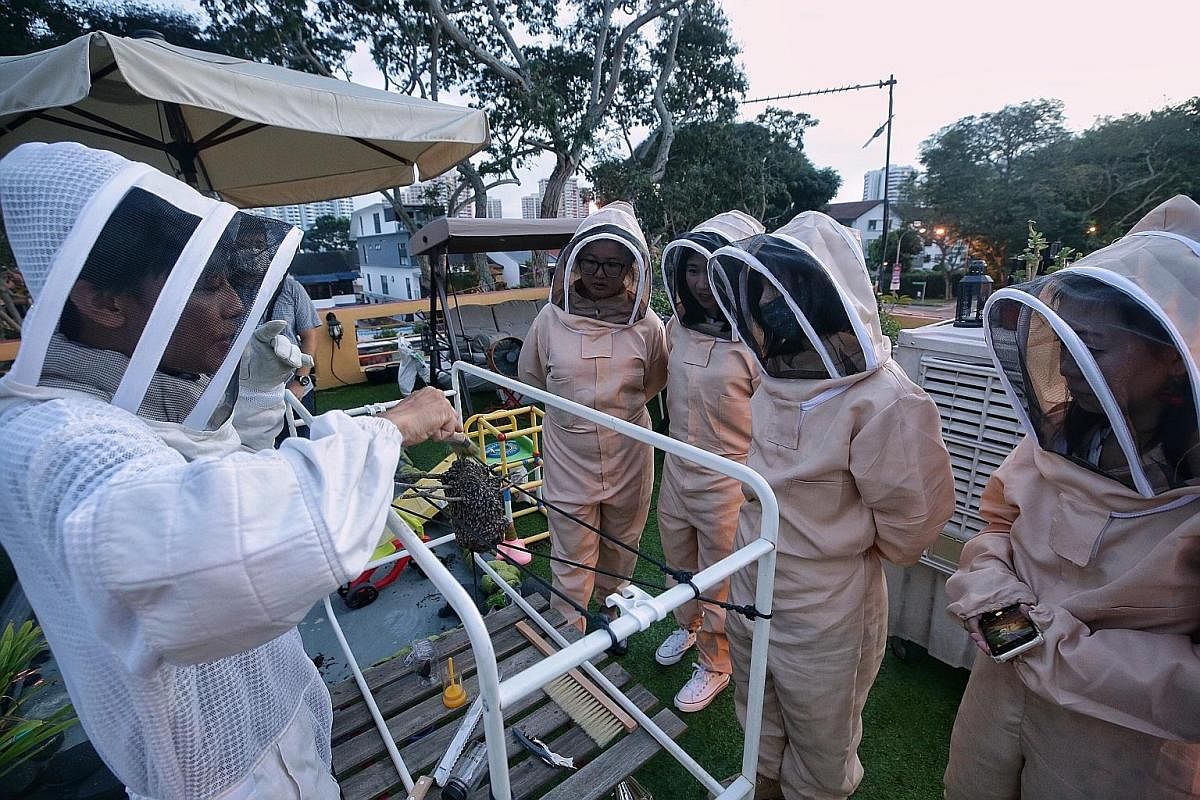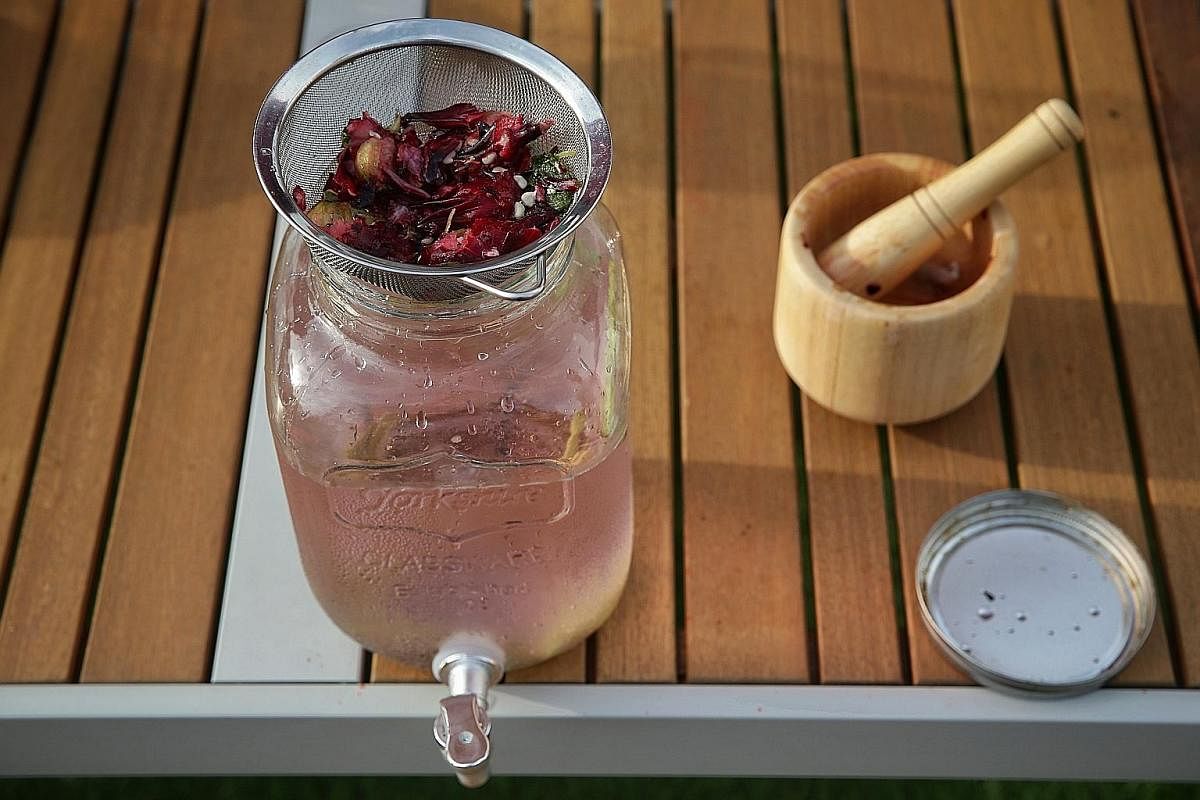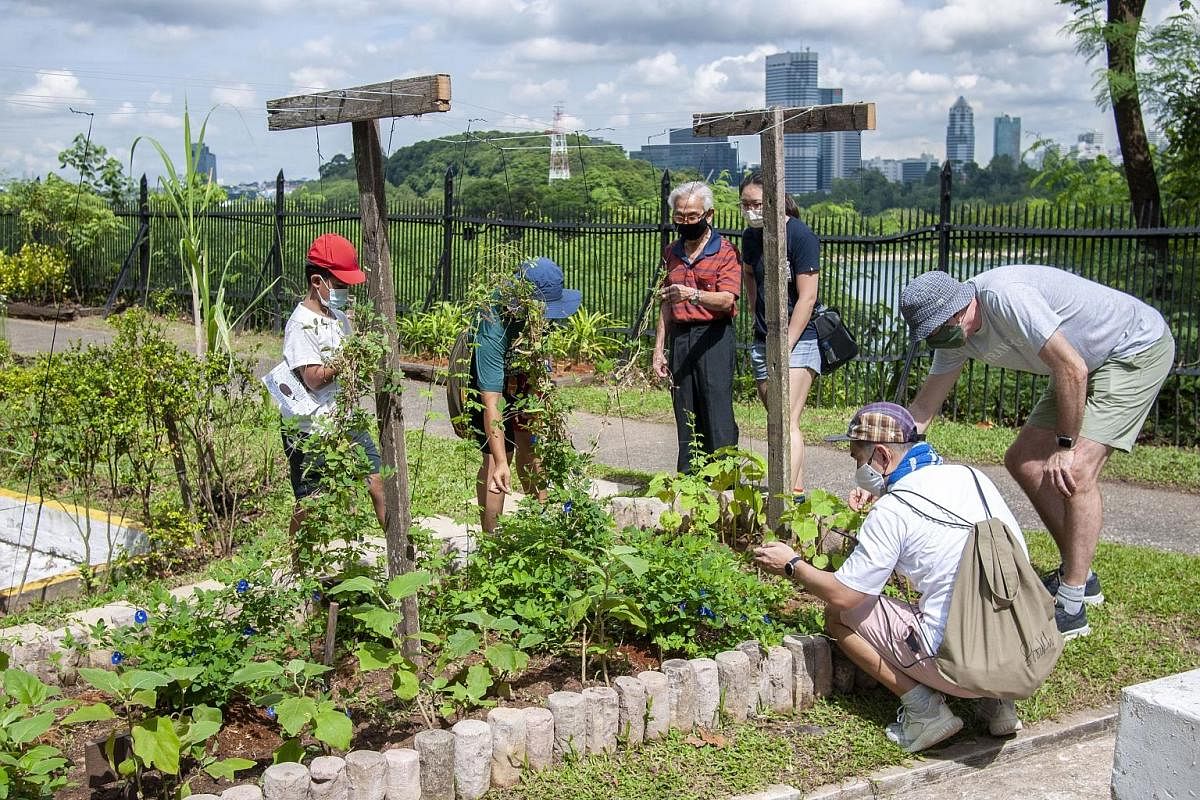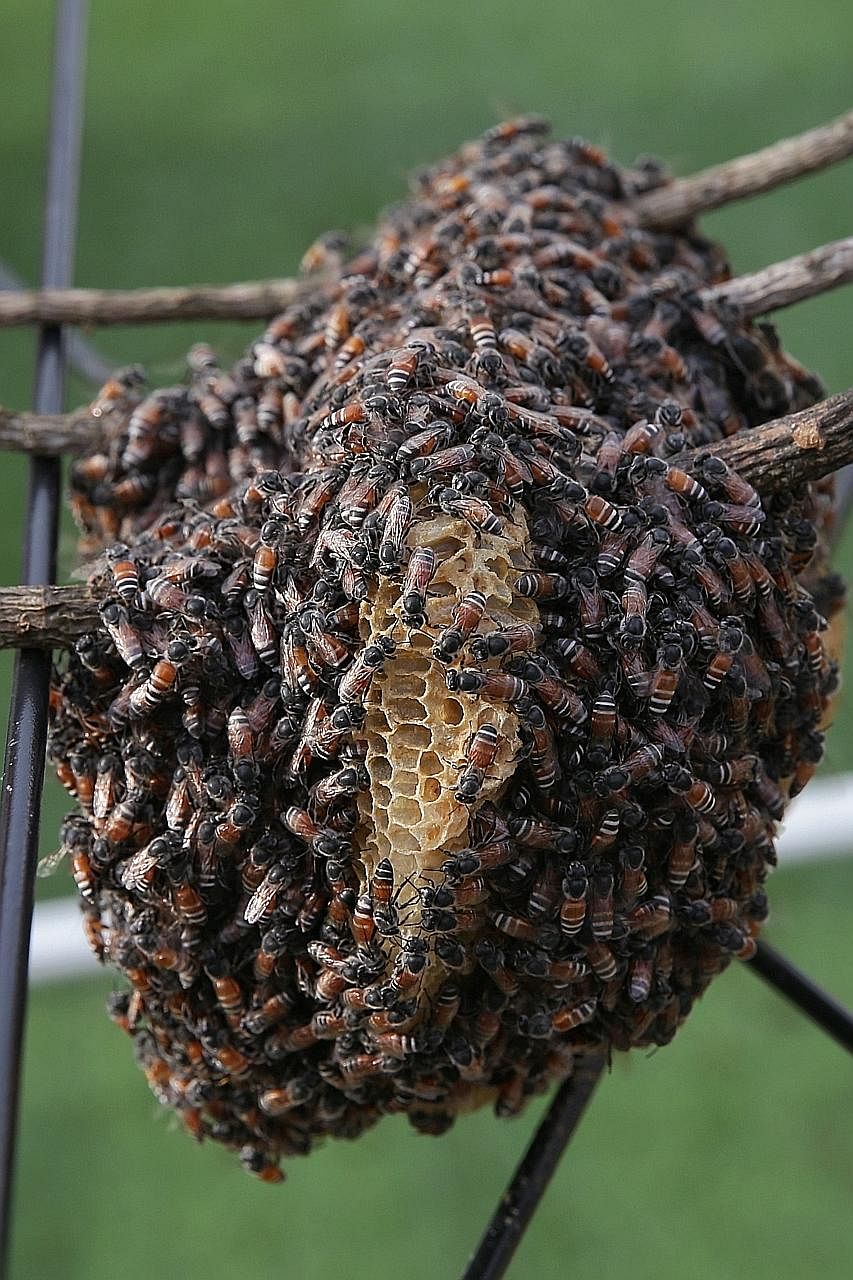-
THE SUNDOWNER ROOFTOP FARM EXPERIENCE
-
WHERE 705A East Coast Road
INFO thesundownersg.com
DURATION Two hours
FEE $95 for those aged 13 and older, $65 for three-to 12-year-olds
Farms all abuzz: Urban farms come up with more ways to engage visitors
Urban farms come up with more ways to engage visitors as the travel drought stretches on





The Sundowner: Rooftop farm in trendy Siglap
There is a sense of raw, do-it-yourself whimsy at The Sundowner, a lounge-cum-urban farm atop a Siglap shophouse that opened last month.
To enter, guests must pick their way through a shallow pond that brims with aquatic plants, balancing on rocks that wobble just a little.
Then, there is the rope-and-basket pulley system that owner Clarence Chua devised to haul up food deliveries and lower bundles of Thai and sweet basil from his rooftop garden in return.
Passers-by and patrons at the Spanish restaurant next door gape. Sometimes, when the harvest is bountiful, Mr Chua sends down some for them.
Watching all this from atop feels like being in on a secret, the sort of place one chances upon at the recommendation of his Airbnb host or hotel concierge.
Guests can book the event space for private gatherings such as movie screenings and wedding proposals, or take part in an experience that comprises hands-on urban farming, getting up close to a beehive, honey tasting and enjoying farm-to-bar drinks.
Even the farm's existence is serendipity at play. Mr Chua, who is also general manager of landscaping company Country Cousins, found the shophouse in July while looking for a place to house five foreign workers.
He had previously moved his employees out of various foreign worker dormitories from March, after the first Covid-19 cases were detected there.
After shuttling them around various apartments over the next few months, including a condominium he owns in Bugis, Mr Chua wanted to settle them in more permanent quarters.
But landlords were leery of renting to foreign workers.
"The tenant profile doesn't fit," he was told repeatedly.

His cousin, a real estate agent, finally found the Siglap shophouse, which Mr Chua describes as "love at first sight".
The second-floor home, where five workers now stay, was well-kept. And to his landscaper's eye, the empty concrete roof brimmed with possibility.
"Urban farming has become popular, but I have done only ornamentals so far. I already know how to make plants thrive - it was just a matter of putting in new plants. This was the perfect chance to experiment," says Mr Chua, who is married to a public servant.
The couple, both 37, have two sons aged 10 months and 31/2.
Mr Chua had previously built ponds, but not streams, for landscaping clients and took the chance to incorporate the latter, filling half of it with plants such as water hyacinth and water lettuce, and chlorinating the other half that leads to a children's play pool.
Other experiments proved more hazardous.
While moving a metal shed from a storage facility to the rooftop, Mr Chua discovered a beehive in a corner.
Inspiration struck and the entomophile, whose former pets include scorpions, tarantulas and snakes, decided to introduce bees into his farm.
He put out a call to landscaping clients, offering free removal of bees nests if they discovered one on their premises, and learnt to relocate nests from books and YouTube videos.
In the beginning, lacking protective gear, he was once stung eight times on his face and had to get a steroid injection to bring the swelling under control.
Bees sting in clusters, he explains, as they release a pheromone to warn other bees of danger. The scent, a saccharine mix of nail polish and bananas, has now become a warning for him, too.
Cloaked safely in bee suits, visitors face no such risk.
From behind a netted hood, we watch as Mr Chua explains bee behaviour, such as huddling together when they sense rain so as to protect the comb, or fanning their wings at the entrance of a hive to regulate the temperature within.
A honey-tasting session opens our eyes to the tastes, textures and colours of honey from around the world, from the warm, caramel notes of blue gum from Australia, to the woody and resinous dark amber pine honey from the Mediterranean.
We also hear from farmscaper Jeremy Beckman, who, together with Mr Chua, planted rows of Asian herbs such as laksa leaves, Thai basil and kaffir lime, as well as more finicky varieties such as thyme, sage and rosemary.
Mr Beckman, 35, explains what goes into a good potting mix as we layer soil with a bag of compost he has prepared.
"Good soil should not smell bad," he says. Indeed the black mix, comprising waste such as leaf litter and horse manure, is odourless when I scoop it up with my bare hands.
Cuttings of Thai watercress, pushed into the soil, take root easily and flourish by the kitchen window over the next few weeks with minimal effort.
We cap the experience with a sampling of cocktails, included as part of the package.
A bourbon smash, garnished with calamansi and mint and sweetened with stevia in its original plant form, is tangy and refreshing. And the evening ends on a sultry note with burnt sage garnishing Laphroaig whiskey, known for its smoky flavour.
Other seasonal drinks, such as a Bloody Mary when the tomatoes fruit, or a gin and tonic with homegrown cucumber, are in the pipeline. Regardless of which plants bear fruit, they will make it work.
Mr Chua says: "Despite the pandemic, or perhaps because of it, The Sundowner was born. Even in adversity, there is always opportunity."
Edible Garden City: Eating local to meet sustainability goals
For those who have lived through the wartime years, crops such as sweet potato and tapioca can still conjure up memories of scarcity and hunger.
But now, these tubers could play a small part in realising Singapore's food-security goals.
That was what urban farming social enterprise Edible Garden City wanted to highlight at its Wartime Food and Sustainability workshop, held in collaboration with Sentosa Development Corporation.
During the workshop at Fort Siloso last month, participants revisited the dark days of the Japanese Occupation at the Surrender Chambers and learnt how people adapted their food sources.
It was not just a history lesson. Guests were also brought back to the present as they found out crops such as sweet potatoes and tapioca can grow easily in Singapore's tropical climate.
They also got their hands dirty learning to grow sweet potato leaves from cuttings and tapioca tubers from stems.
"We wanted to highlight these plants as regionally native ones that people can consider growing and incorporating in their diet," says Ms Sarah Rodriguez, head of marketing at Edible Garden City.
For instance, sweet potatoes can be baked, mashed or served as fries, while their leaves make a tasty stir-fry. Tapioca, meanwhile, can be sliced and made into cassava chips or baked. Their leaves can also be stir-fried.
Ms Rodriguez says for many people, consumption habits are shaped by Western recipes and imported produce in supermarkets, such as kale.
But eating locally grown produce is fresher, more nutritious and has a lower carbon footprint, points out urban farming educator Eunice Ong. It also supports Singapore's goal of producing 30 per cent of food locally by 2030.
The workshop, attended mostly by families, was originally slated for April, but had to be postponed because of the coronavirus pandemic. Twenty-eight people attended three sessions and organisers have plans for future collaborations.
Ms Ong says: "Besides the connection to sustainable starches, we wanted to highlight how people can be creative and resourceful in times of adversity, and that the human spirit can triumph over obstacles."
Clara Lock
City Sprouts: Have a Farm Day Out
Urban farming has taken root here in recent years, with hobbyists growing herbs along corridors, in community gardens and soon even on HDB carpark rooftops. If you are not sure where to start, City Sprouts' bi-monthly Farm Day Out may offer some inspiration.
Organised by social enterprise City Sprouts at its Henderson Road farm Sprout Hub, it is a chance for the public to interact with about 35 commercial and hobbyist farmers, who rent plots in greenhouses.
While the farm welcomes visitors daily, it is only during the open house that most farmers will be there to introduce their crops and growing methods.
These include aquaponics, in which waste produced by reared fish supplies the nutrients for plants; and aeroponics, in which plant roots grow in the air and are watered by a nutrient solution mist.
-
FARM DAY OUT AT SPROUT HUB
-
WHERE 102 Henderson Road
Some farmers rear chickens, while others grow strawberries and medical mushrooms such as cordyceps and lingzhi.
City Sprouts co-founder Chee Zhi Kin hopes that by getting up close to the process, people will be less intimidated by farming. Many of their tenants are beginners, he points out, and went through trial and error to produce crops such as herbs and leafy greens.
"We want to showcase the diverse ways people can grow and farm and show how easy it is to be involved in growing your own food," he says.
The Farm Day Out sessions have been a long time coming. City Sprouts, which was founded in 2018, moved into its current premises at the former Henderson secondary school last year.
The founders spent about six months renovating it and planned an official opening for March, only to have it scuppered by the coronavirus pandemic.
In August, its first open house finally took off. It has since expanded to include fringe activities such as a fashion swop, held in collaboration with clothing swop movements My Zero Waste Wardrobe and Cloop.
And at the recent Christmas edition held last week, guests contributed to a community sculpture in which they created a Christmas tree out of old plastic bottles. A total of 200 people visited the farm over four sessions.
The next Farm Day Out is slated for February, where Mr Chee hopes the regulations will have eased to allow for more visitors.
"Covid-19 threw us a curveball in our first year here and we have been forced to adapt, but we are finally seeing the light at the end of the tunnel," he says.
Clara Lock
Join ST's Telegram channel and get the latest breaking news delivered to you.
A version of this article appeared in the print edition of The Straits Times on December 22, 2020, with the headline Farms all abuzz: Urban farms come up with more ways to engage visitors. Subscribe

